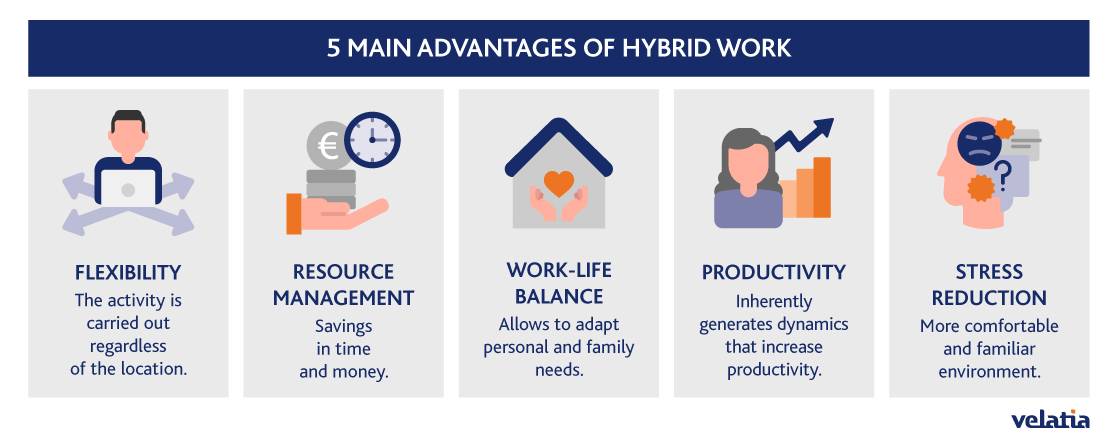
Hybrid work is one of those trends that is here to stay, but do we know what it is and why it can be a competitive advantage?
Human history is full of tragic events that, by their disruptive nature in different ways, have accelerated cultural, social and economic change. This is something we can find in examples such as the tragedy of war, which has led to scientific advances due to desperate military necessity, or how the fall of some predominant empires led to the rise of new cultures. But today we are going to focus on another revolution, in this case a technological and labour revolution that has emerged in recent years spurred by another tragic event: the COVID-19 pandemic and the consequent rise of hybrid work.
The COVID-19 pandemic, which we are fortunately managing to bring to a close after several years, led to events that until then were little short of fiction in the 21st century: restrictions on movement, quarantines, sudden cessation of activities…. But it also made a virtue out of necessity and meant that companies and the working model had to adapt in order to be able to continue economic activity. Thus, many people exchanged their offices for their homes and entered a world that until then had been reserved for a select few: teleworking or hybrid work. Well, this model of work is still in force, even though the pandemic seems to be coming to an end, and it does so because it generates a series of very interesting competitive advantages that we are going to discuss today.
First of all, it would be interesting to define what we consider hybrid work. This could be explained as a work model in which employee and company have agreed on a flexibility to carry out their work without establishing a fixed place for such tasks. Thus, teleworking considers the office, the home or any other place as a suitable place to perform telework. For this, there must be a technological ecosystem that allows the correct work performance; therefore, collaboration and communication tools, internet connection and cybersecurity stand as a fundamental trident for this formula to be successful. But what are the advantages of this work model and why do we say that it is here to stay?
What are the main advantages of hybrid work?
Main advantages of hybrid work

Hybrid working offers a number of advantages for both employees and companies, including:
- Flexibility: One of the great advantages is the flexibility that allows the employee and the company the fact that the activity can be carried out regardless of the place where it is performed. In this way, workers who have the necessary technological ecosystem will be able to carry out their work regardless of the place, adapting to the needs of their personal and professional life. This balance is a competitive factor for the company and a work quality factor for the employee. A textbook win-win.
- Better resource management: Not having to commute to the workplace every day automatically saves time and money. This also allows the company to have its employees on time by avoiding traffic jams or delays caused by transport to the workplace. This also means that employees can start on time, as well as generating savings on food, fuel, office rents, work clothes, etc.
- Work-life balance: Working from home automatically means being able to adapt to personal and family needs, which in turn generates a work-life balance for employees.
- More productivity: While work-life balance is growing, so is productivity. Working from a comfortable location inherently generates productivity dynamics for employees by having the flexibility to work in different locations. Employees can choose the location that best suits their work style.
- Stress reduction: Hybrid working can reduce stress related to commuting and allow employees to work in a more comfortable and familiar environment.
All this has resulted in the emergence of a new type of worker: digital nomads. These professionals base their work on the use of new technologies and move from one place to another while carrying out their work remotely. In this way, these people choose places that suit their lifestyle, whatever it may be, and companies that allow them to work in this way. A paradigm that was unthinkable just a few years ago.
But all that glitters is not gold, and hybrid work has a series of inherent cybersecurity risks. Connecting from any WiFi network just like that can be a serious problem for both company and employee, putting confidential and personal information at risk. For this reason, we are going to take a look at the cybersecurity tips we should bear in mind when teleworking.
What cybersecurity tips to consider for teleworking?
As we said, these work dynamics create new challenges from a cybersecurity perspective. Let’s look at how we can apply a number of cybersecurity tips to protect our work:
- Use of VPN: Having a VPN to allow employees to connect to the corporate environment securely is essential. In fact, it is the easiest way to protect the information we transmit online.
- Updating software as well as hardware: Hackers are dedicated to exploring vulnerabilities within software systems. That’s why it’s critical for employees to keep the software on their work tools, as well as their own devices, up to date. These updates can close the loopholes that hackers are looking for.
- Use complex and unique passwords: A device without a strong password is synonymous with disaster. That is why employees should use strong and unique passwords for each device and account, try to change them regularly and avoid sharing them with others.
- Avoid suspicious links: Clicking on a suspicious link in an unsolicited email does not seem like a good idea. In these cases we should use our common sense and not click on or download content sent to us by unknown or suspicious senders.
- Avoid using personal devices for professional purposes: Our personal devices are exposed, due to their more leisure use, to a number of risks that we should avoid mixing with our work devices. In addition, we have to take into account that it is not easy to protect our personal devices with the quality standards necessary for our work.
- Do not leave our work tools unprotected: No one should ever neglect their professional devices, let alone leave them momentarily unprotected without a password. Here, once again, common sense must prevail.
- Education: The willingness of individuals is just as important as companies’ education of their employees on cyber security for hybrid work..
How can I ensure the success of this working model in my organisation?
As in so many other things, success can only be achieved by working side by side with the best professionals in the field. When we talk about hybrid work, the name of Ikusi must appear in the equation. This technology services company, specialising in the field of digitalisation and cybersecurity, has extensive experience in the implementation of hybrid work models and collaboration tools for a multitude of companies. In addition, their role as cybersecurity experts ensures that professional and personal information is properly protected.
If you want to know more, click on the picture below:




